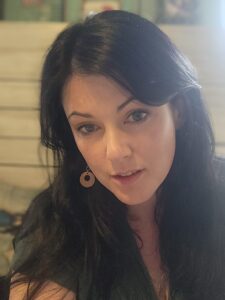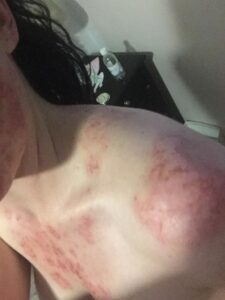Trigger Warning: This post contains a graphic image of a lupus rash. While it is included to raise awareness and provide an honest look at the realities of living with lupus, we understand that some readers may find it distressing. Viewer discretion is advised.
Living with lupus is a relentless battle—one that Angela Knight knows all too well. In this deeply personal account, she shares the raw reality of navigating chronic pain, uncertainty, and emotional turmoil. From near-death experiences to the transformative power of therapy, Angela’s journey is one of resilience, self-discovery, and ultimately, hope.
Here, in her own words, is Angela’s incredible journey:
 It has been quite a journey.
It has been quite a journey.
So many ups and downs, somewhat of a whirlwind of emotions.
Many near-death experiences, pain beyond belief, with no relief, the mental torture of not knowing if or when this disease will kill you. Many people with lupus have a “normal” life expectancy. However, there are exceptions.
Am I going to be a statistic?
What if I die?
Or worse—what if I can’t physically take care of myself?
What if no one believes me because I look fine?
Lupus isn’t a real disease, it’s all in your head…
And the negative self-talk list goes on and on. Often getting reinforced, by well-meaning, people who don’t understand.
This is what eventually broke me, no, shattered me. The most isolated period in my life came compliments of a divorce when my seemingly perfect marriage came to an end. I spent the next year trying to pick up the broken pieces of my life while dealing with the fact that my lupus was getting worse.
Some days I couldn’t walk due to inflammation in my hips, other days I would twitch. Sometimes, I would forget how to talk and I would forget where I was. These were just a few uncomfortable gifts that lupus gave me. Not to mention the blinding migraines, anxiety attacks and insomnia from high doses of cortisone.
Disassociation can only take you so far before you crack. And crack I did.
I got an appointment with a clinical psychologist, Neil, who diagnosed me with CPTSD (Complex Post-Traumatic Stress Disorder). We started with what they call debriefing sessions facing the trauma, dealing with very uncomfortable things. I was doing my best to get through it all with no medication while it was the most difficult pain that I had to face. My psychologist respected the fact that I wanted—NO—I needed to do it without any medication because I felt as though every time I faced something, more medication would be added to my handfuls of meds. He allowed me the space and freedom to work at my own pace.
It was the first time in my life that I felt truly understood.
Therapy changed my life so significantly, but I had such mixed emotions. I was empowered but at the same time didn’t want to dig up what I thought was history. I was fortunate enough to have the tools by the time these thoughts crept in. I eventually got to the point where tools were not enough to deal with the pain of facing my trauma (that I didn’t even know I had).
Honestly, I almost stopped therapy.
After approximately a year of seeing him, I trusted him enough to ask for more help. It was an internal struggle that I had to face. I was embarrassed that I wasn’t strong enough. But I was realistic. So we made an appointment with my now psychiatrist, who could only see me a few months later.
One day, before my first appointment, I had a flood of tears that just couldn’t stop. My GP prescribed antidepressants and Urbanol which helped with the crying. And something to help me sleep. I think I slept for 2 days straight.
It wasn’t long after that I got to see the psychiatrist. She adjusted the meds according to my needs. She also did an MRI and EEG—we had caught things early, and there was no scarring on the brain yet. I was, however, at risk for a stroke because of the inflammation in my blood vessels. I was then put on medication to assist with the pain which worked like a charm. She explained that when you are in pain all the time, a person gets so tightly wound, and anxious, it’s just exhausting. So once we got all of that under control, I was ready to stop feeling sick all the time. It became a case of this is happening, it’s not ok, I’m not ok, but I am excited to wake up one day, and say, “I’m ok!” Don’t get me wrong. There were many bad days, days when I was so close to giving up, and days when I would pass out because of chronic fatigue.
 More of my meds stopped working, and I developed spondylitis and psoriatic arthritis, along with rheumatoid arthritis. It was devastating, and I had gained so much weight from the tablet that stopped the migraines, blanking out, and shaking.
More of my meds stopped working, and I developed spondylitis and psoriatic arthritis, along with rheumatoid arthritis. It was devastating, and I had gained so much weight from the tablet that stopped the migraines, blanking out, and shaking.
I would often go, and discuss things with Neil, never 100% touching on these deeper feelings. And if I did, it was a matter of fact. He always knew though.
After all the meds were not working, I had to go on Cyclosporin. That was the first time I ever got afraid of the meds, the potential risks were out of this world.
We discussed it over a few sessions, while Cyclosporin was getting approved. Neil helped me come to the conclusion that I actually had no choice. It was an incredibly low point. I felt helpless. Nevertheless, it was approved. I started the medication.
To my surprise, I had hardly any side effects—a bit of nausea, and vomiting, some days more than others, but it settled after a month. After all the concerns, tears, and anger, it was a non-event really. I felt so stupid. Again, he helped me through those emotions, making me realize that it’s ok, and it’s not nothing, it was really scary.
A few months later, Cyclosporin stopped working, my pain meds had increased, and I was a zombie. It was time to apply for biologics. More anger came out, I had to wait for the new year to upgrade my medical aid. Feeling so sick and tired of all of this, I just wanted to die. But, that wasn’t an option, I had to suck it up for my children’s sake, they need their momma. So my sessions turned into a lot of, “How do I help them deal with seeing me so sick?” It took a huge toll on them. But we navigated through it day by day.
I would tell myself. “I’m not always going to feel like this, in a week I will feel different,” Sometimes, I was better in a week, and other times I was worse, but it was always different. I learned to appreciate the weeks that I felt good and push through on the weeks that I didn’t. I felt as though I was in an emotional war. Without my sound mind, I would have lost.
By the time the following year came and the upgrade was done, the medical aid decided to change their mind about the Rituximab which is specifically for lupus, and only cover Humira which is mostly for arthritis. I felt that it was another nail in my coffin, but we went with it. This drug has boxed warnings about the risk of serious infections and cancer. These are serious warnings from the Food and Drug Administration (FDA). I spent the hour before taking it, at Neil’s office, discussing my crisis. I felt that it wasn’t fair to put my stress on my family. Again he helped me get to a place of acceptance, and I took the injection.
I was warned about allergies and possible death when starting it. Once again, to my surprise. There was nothing. No side effects, except that I get tired after taking it, and I sleep for most of the next few days. After 6 treatments, I went to my doctor, it was March or April. She was very happy with my blood tests, and how the Humira was working.
Over the next 8 months, I slowly stopped needing my pain medication, I reduced it slowly, until one day I woke up pain-free. I also didn’t need Urbanol or Trazidone anymore, it was amazing. There was a marked difference to the past 20 years of my life. There were obviously ups and downs, but my mind stayed strong. Even when it wasn’t good, I knew myself well enough and how to get myself out of the negative space quickly.
In November 2024, I went to see my doctor. She was a lot more chatty than usual. After my exam, we sat down. She looked at me with the biggest smile and told me there was absolutely no lupus activity. She had suspected it from my previous appointment. For the first time since being diagnosed, I wasn’t just stable, I got the news that I was in remission.
Una asked me to share my journey. I was apprehensive at first because I didn’t think anyone would want to know. I realized that whether or not I’m right is irrelevant.
I just want people to know that there is hope.
What I have come to realize is that lupus is a guessing game and a mind game. A lot of it is in the mind, I don’t mean it in a condescending way. Our minds are powerful, and our emotions too. My relief came when I was able to start marrying the two. Finding a balance, allowing myself to feel, without it taking over my body. I was horribly sensitive, I processed my emotions in my whole body, but never showed them. I only knew how to explode. Taking this painstakingly long journey has been a worthwhile investment. Not only for me but for my future generations.
It isn’t over, I still have struggles, but I’m well on my way to complete emotional healing.
Just remember, only you know what you deal with every day, only you can validate yourself. Don’t be your own enemy, be kind.
Would you like to share your own lupus story? Your experience could inspire and offer hope to others facing similar challenges. Reach out to us and become part of our Real Lupus Journeys series—your story matters, and together, we can empower one another. Contact Una at hellocpt@andreasgift.co.za for more info.